المساعدات النقدية والقسائم والمخاطر
ما سبب أهمية هذا الموضوع؟
أحد الأسباب الرئيسية التي تجعل الجهات الفاعلة الإنسانية لا تفكر بشكل روتيني في النقد (الهدف رقم 2 من الإطار العالمي للعمل) هو تصورات المخاطر. ويرتبط هذا القلق بالتركيز المتزايد من قبل الجهات المانحة على مكافحة الإرهاب وغسيل الأموال وتقليص الميزانيات المخصصة للمساعدة الإنسانية.
كانت هذه نتيجة رئيسية من تقرير حالة العالم النقدي لشبكة CALP، والذي أشار أيضًا إلى أن الجهات المانحة قد تتسامح مع تحويل مبلغ صغير من المساعدات العينية ولكن يمكن أن تكون أكثر حساسية تجاه تحويل الأموال النقدية. تم نقل هذه الحساسية من الجهات المانحة إلى الوكالات الإنسانية الأخرى. تعتبر هذه القضية حساسة بشكل خاص في بيئات النزاع، حيث تشكل الجماعات المسلحة تهديدًا ويصعب على الجهات الفاعلة الإنسانية الوصول إلى المجتمعات المتضررة والإشراف على الاستجابة.
ما هو شكل التقدم المحرز في هذا المجال؟
لكي يتم النظر في المساعدات النقدية والقسائم بشكل منتظم، فإن النجاح يعني ما يلي:
- ويتم الكشف عن الخرافات بشأن المساعدات النقدية والقسائم ويتغير خطاب ومواقف وسلوك الجهات الفاعلة في المجال الإنساني حول مخاطر التحايل
- يتم النظر في المساعدات النقدية والقسائم بشكل منهجي وعلى قدم المساواة، على أساس أدلة المخاطر الفعلية عبر الطرائق
- لا تمنع الحواجز التنظيمية، مثل أجندة الجهات المانحة لمكافحة الإرهاب والتخلص من المخاطر، النظر المنتظم في النقد.
- يتم التعامل مع المخاطر من خلال التعاون بين الجهات الفاعلة الإنسانية التشغيلية والحكومات والجهات المانحة والمؤسسات المالية.
يمتلك الموظفون التشغيليون القدرات والأدوات العملية لتحديد المخاطر والتخفيف من حدتها.
للعمل نحو هذه الأهداف يعني معالجة المخاطر على مدار دورة المشروع، بناءً على الأسئلة التالية:
- تحليل الموقف: كيف يتم إدراك المخاطر الخاصة بالمساعدات النقدية والقسائم؟
- تحليل الاستجابة: كيف تؤثر مخاطر محددة من المساعدات النقدية والقسائم على اتخاذ القرار؟
- تصميم البرنامج: ما هي تدابير التخفيف المطبقة بالفعل؟
- التنفيذ: كيف يمكن أن اعتماد البرامج وتدابير التخفيف بمرور الوقت؟
- الرصد والتقييم: ما مدى فعالية تدابير التخفيف وما هو تأثيرها؟
المبادرات والأخبار الجارية
على مدار الأشهر المقبلة، سنعقد مجموعة من الاجتماعات مع الجهات الفاعلة لمناقشة مواضيع مختلفة تتعلق بموضوع المخاطر، مع أهداف تعزيز النقاش وتوليفه، وتوفير منتدى للجهات الفاعلة لمشاركة أفضل الممارسات، وضمان تعزيز الخبرات على المستوى الميداني في العالم.
17 تشرين الأول: الندوة: مشاركة البيانات الخاصة بالمساعدات النقدية والقسائم: الأخلاق والملكية والخصوصية
29 تشرين الأول: المساعدات النقية والقسائم والمخاطر المتعلقة بالاحتيال وحماية المستفيدين، دوالا، الكاميرون
31 أ تشرين الأول – 1 تشرين الأول: المساعدات النقدية والقسائم في سوريا، غازي عنتاب، تركيا (حدث خاص)
21 تشرين الثاني: الندوة: الجاهزية التنظيمي لإدارة البيانات.
26 تشرين الثاني: التركيز على حماية بيانات المستفيدين في العمل، داكار، السنغال.
4 كانون الاول: فعالية أسبوع النقد: مكافحة تمويل الإرهاب وتدابير مكافحة غسل الأموال في المساعدات النقدية والقسائم، ومسؤولية البيانات وحمايتها في المساعدات النقدية والقصائم في المجال الإنساني، لندن، المملكة المتحدة. تعرف على المزيد هنا.
تعمل مجموعة متنوعة من المنظمات حاليًا على المساعدات النقدية والقسائم والمخاطر. تعمل شبكة CALP على تحديد أوجه التآزر بين الجهات الفاعلة، وتجنب الازدواجية، وتحديد الأولويات المشتركة التي يمكن معالجتها بشكل جماعي بشكل أفضل. بالاشتراك مع برنامج الأغذية العالمي، تشارك شبكة CALP في تحديد أولوية المخاطر ضمن مسار عمل الصفقة الكبرى بشأن النقد.
دراسة حالة عن المخاطر في مالي باللغتين الإنجليزية والفرنسية.
دراسة حالة عن المساعدات النقدية والقسائم والمخاطر في اليمن، تقرير كامل.
يمكن مشاهدة ندوة الويب الخاصة بنا حول مشاركة البيانات في المساعدات النقدية والقسائم: الأخلاق والملكية والخصوصية
يمكن مشاهدة ندوة الويب الخاصة بنا التي تعرض رؤى من مؤلفي دراسات الحالة الخاصة بنا في اليمن وشمال مالي.
لمزيد من المعلومات، يرجى الاتصال بآنا كونداخشيان.
Latest
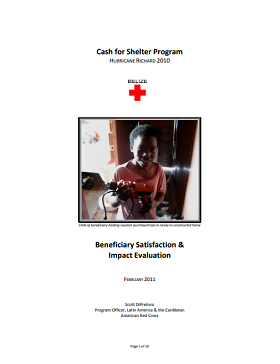
Cash for Shelter Program – Hurricane Richard 2010
Report
A beneficiary satisfaction and impact evaluation of IFRC’s Cash for Shelter Program that ran in response to Hurricane Richard, a category 2 Hurricane Richard that made landfall 20 miles southwest of Belize City on October 24, 2010. The established goal of the BRC program was a faster recovery of the...

Somalia CBGWG Terms of Reference
Policy paper
The terms of reference of the Somalia Cash Based Response Working Group.

Delivering Cash Through Cards – A Quick Delivery Guide (booklet)
Guidelines and Tools
A Quick Delivery Guide to delivering money through cards (magnetic stripe or smart cards). Prepared as a practical tool, this guide provides a brief synthesis of the necessary preconditions and advantages and disadvantages of using cheques. It also provides practical implementation tips. This version...
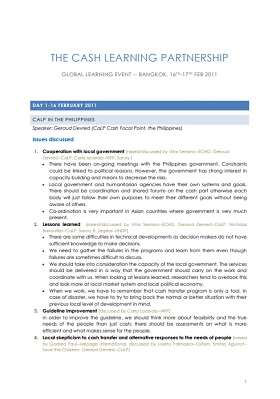
The CALP Network 4th global learning event: Global innovations and lessons learned from response in South and South-East Asia (Complete workshop notes)
Report
The 4th the CALP Network Global Learning Event was held in Bangkok, Thailand on the 16th and 17th February 2011, hosted by the CALP Network in partnership with the International Federation of the Red Cross and Red Crescent Societies (IFRC). This inter-agency event was designed to present the latest...

Cash transfer programming in emergencies: The Cash Learning Partnership’s 5th Global Learning Event
Report
The CALP Network’s 5th Global Learning Event was organised in partnership with the International Federation of Red Cross and Red Crescent Societies (IFRC). The learning event took place in Nairobi, Kenya, and focused on three topics of emerging importance not only to cash transfer programming, but to...
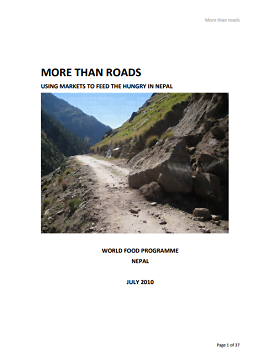
More than roads: Using markets to feed the hungry in Nepal
Report
This report, based on research in Nepal, focuses on the importance of markets and road infrastructure, which could be used to inform longer term food security strategies. The report goes through the basis of the research, the context of the market environment and highlights the services provided and the...
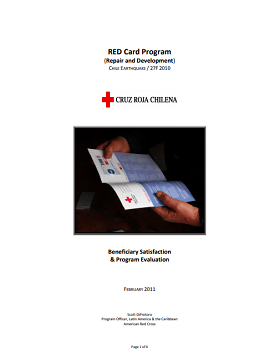
RED Card Program (Repair and Development) Chile Earthquake 2010
Report
On 27 February 2010 an earthquake measuring magnitude 8.8 on the Richter scale struck the Bío-Bío and Maule regions of Chile, at a depth of only 35km. This earthquake was then followed by an equally devastating tsunami. This double disaster left more than 480 people dead, more than 1.8 million people...

Voucher Fairs: A Quick Delivery Guide (booklet version)
Guidelines and Tools
A Quick Delivery Guide to using voucher fairs to implement a market-based emergency response. Prepared as a practical tool, this guide provides a brief synthesis of the necessary preconditions and advantages and disadvantages of using voucher fairs. It also provides practical implementation tips. This...
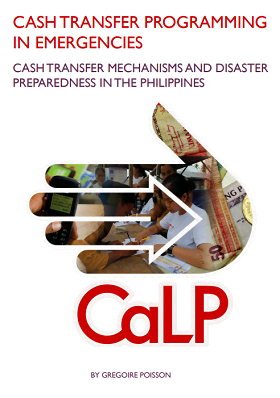
Cash transfer mechanisms and disaster preparedness in the Philippines
Report
The use of cash to deliver assistance in case of humanitarian emergency remains a relatively new approach in the Philippines, and aid agencies are at the early stages of developing guidelines, policies and organizational capacity to implement cash projects. Project managers lack support and guidance with...
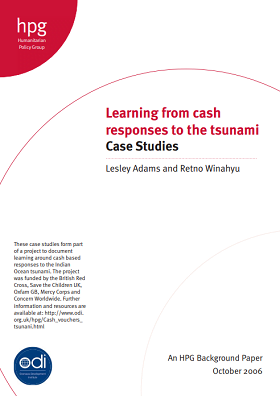
Learning from Cash Responses to the Tsunami: Case Studies
Case Study
These case studies form part of a project to document learning around cash based responses to the Indian Ocean tsunami. The project was funded by the British Red Cross, Save the Children UK, Oxfam GB, Mercy Corps and Concern Worldwide.
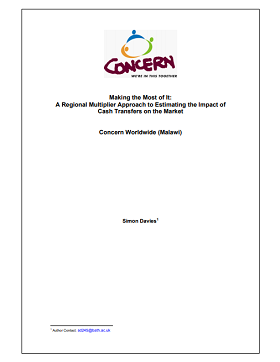
Making the most of it: A regional multiplier approach to estimating the impact of cash transfers on the market
Case Study
This study examines the regional multiplier effect resulting from Concern’s emergency cash transfer programme in Dowa district in Malawi, which experienced a food deficit in 2006. It uses a Reduced Social Accounting Matrix to calculate and analyse the impact of the cash transfers on different economic...

IASC Evaluation of the Humanitarian Response in South Central Somalia 2005-2010
Case Study
This independent report presented by DARA confirms that humanitarian aid in Somalia has saved thousands of lives between the years 2005 to 2010. The report is based on an evaluation of the humanitarian response in south-central Somalia and is one of the most comprehensive evaluations of aid in Somalia...
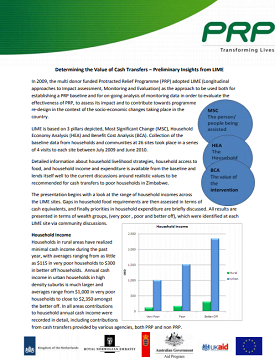
Determining the Value of Cash Transfers – Preliminary Insights from LIME
Report
In 2009, the multi donor funded Protracted Relief Programme (PRP) adopted LIME (Longitudinal approaches to Impact assessment, Monitoring and Evaluation) as the approach to be used both for establishing a PRP baseline and for on-going analysis of monitoring data in order to evaluate the effectiveness of...

Voucher Fairs: A Quick Delivery Guide (screen version)
Guidelines and Tools
A Quick Delivery Guide to using voucher fairs to implement a market-based emergency response. Prepared as a practical tool, this guide provides a brief synthesis of the necessary preconditions and advantages and disadvantages of using voucher fairs. It also provides practical implementation tips.

Support to Economic Recovery of Urban Households in Karoi town, Zimbabwe (the CALP Network Case Study)
Report
In the urban area of Karoi, Zimbabwe, Save the Children combined cash for work with livelihoods support to meet the immediate food needs and support the economic recovery of poor families. The project used smart cards to transfer cash to beneficiaries, which proved to be an appropriate payment...
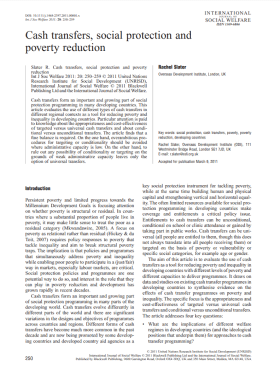
Cash Transfers, Social Protection and Poverty Reduction
Policy paper
Cash transfers form an important and growing part of social protection programming in many developing countries. This article evaluates the use of different types of cash transfers in different regional contexts as a tool for reducing poverty and inequality in developing countries. Particular attention is...

Public Health Agencies and Cash Transfer Programmes: Making the case for greater involvement
Policy paper
This report examines the case for greater involvement by public health agencies in cash transfer schemes, a form of welfare assistance. It seeks to identify opportunities, obstacles and actions that might support greater involvement. The issue arises because cash transfer schemes are an increasingly...

Trading in Turbulent Times: Smallholder maize marketing in the Southern Highlands, Tanzania
Report
The short-run effects of the 2007/2008 global food crisis on semisubsistence farmers’ well-being in low-income countries depends on whether they are net sellers or net buyers of the affected commodities. Realizing that farmers face volatile prices over the course of an agricultural year, this study...

An Evaluation of Save the Children’s Cash Transfer Project in Aweil East County, Northern Bahr el Ghazal State, South Sudan
Report
Since April 2009, Save the Children have been implementing an ECHO-funded cash transfer project in Baac Payam, Aweil East County. The specific objective of this project has been to improve dietary diversity and nutritional outcomes among the targeted households that inhabit a part of Sudan which has some...
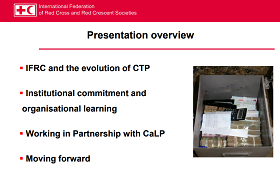
IFRC and the evolution of CTP
Presentation
An IFRC presentation covering the following topics: IFRC and the evolution of CTP Institutional commitment and organisational learning Working in Partnership with the CALP Network Moving forward


